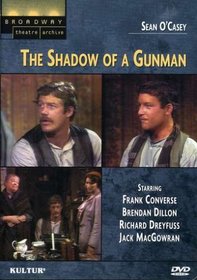| Actors: Frank Converse, Richard Dreyfuss, Jack MacGowran, Sandra Morgan Director: Joseph Hardy Creators: Lewis Freedman, Norman Lloyd, Sean O'Casey Genres: Westerns, Drama, Television, Musicals & Performing Arts Sub-Genres: Westerns, Drama, Television, Broadway Theatre Archive Studio: Kultur Video Format: DVD - Color DVD Release Date: 07/15/2003 Original Release Date: 12/04/1972 Theatrical Release Date: 12/04/1972 Release Year: 2003 Run Time: 1hr 20min Screens: Color Number of Discs: 1 SwapaDVD Credits: 1 Total Copies: 0 Members Wishing: 7 MPAA Rating: NR (Not Rated) Languages: English |
Search - The Shadow of a Gunman (Broadway Theatre Archive) on DVD
  | The Shadow of a Gunman Broadway Theatre Archive Actors: Frank Converse, Richard Dreyfuss, Jack MacGowran, Sandra Morgan Director: Joseph Hardy Genres: Westerns, Drama, Television, Musicals & Performing Arts NR 2003 1hr 20min Is a sensitive and mysterious poet really an IRA gunman in hiding? Set in a Dublin tenement in the 1920's, The Shadow of a Gunman was the first part of Sean O'Casey's celebrated "Dublin Trilogy." Equal parts comedy and tra... more » |
Larger Image |
Movie DetailsSimilar Movies
|
Movie Reviews"I know what you are--a gunman on the run." Mary Whipple | New England | 01/16/2005 (4 out of 5 stars) "Starring Frank Converse as Donal Davoren, Jack MacGrowan as his friend Seumas Shields, Sandra Morgan as Minnie Powell, and a very young Richard Dreyfuss as Tommy Owens, this 1972 production of Sean O'Casey's 1923 play shows the work of a gifted but still inexperienced playwright. The first of Sean O'Casey's "Dublin Trilogy" to be produced (followed by Juno and the Paycock in 1924, and The Plough and the Stars in 1926), the play is set in 1920, after the Irish battle for independence has begun.
Minnie Powell, Seumas, and the other residents of a Dublin tenement all side with the rebels and assume that Davoren, a poet, is an IRA gunman on the run. Seumas is actively involved with the rebels, using his work as a peddler of second-hand goods to make connections and carry information. Gunfire is constant at night, bombs go off, citizens are killed, and the British police raid houses. During a disturbance the night of the action, Minnie takes a bag of bombs, left under the bed by one of Seumas's friends, into her own room to protect Donal, to whom she is attracted, only to face the police in a raid. Walking the tight line between the absurd/satiric and the violent/tragic, the play has relatively little action onstage, with most of the play consisting of witty remarks, poetic commentary, and the dialogue of daily life. Converse as Davoren and MacGrowan as Shields work hard to give life to characters who have little dramatic action. Visits by the landlord, a young, hero-worshipping Tommy Owens (Dreyfuss), the flirting Minnie, an IRA bomb-maker, and other tenants change the mood throughout the act and establish the 1920 Dublin atmosphere, though they do not develop character significantly. The flirtation of Minnie (Morgan) and Davoren (Converse) looks and feels artificial. Most of the first act is a setup for the second, which takes place at night, with gunfire in the distance and the British police raiding the house. The poetry of Davoren contrasts with the grim reality of the gun battle outside, and the elegantly poetic language of the always-sleepy Shields with the brutality of the police, as O'Casey features the men who engage in the chess game of rebellion while the women often make the sacrifices. O'Casey's message about the "excitement" of war is conveyed primarily through language, and not action, despite the actors' best efforts. Directed by Joseph Hardy, the play is a good introduction to the more complex and dramatically effective plays which follow it, and the cast is stellar. Mary Whipple " |





